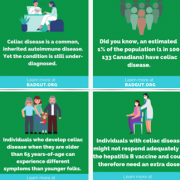Celiac Heroes – Sticking Together to Tackle Celiac Disease
Volunteers with the Manitoba Chapter of the Canadian Celiac Association offer introductory classes for those newly diagnosed with the disease and those navigating the gluten-free lifestyle.
- by Aaron Epp, Winnipeg Free Press 1
Christa Dubesky calls them “Christa-isms” — personal quirks she feels make her uniquely herself. For most of her life, those quirks included ailments such as skin rashes she couldn’t explain.
Six years ago, Dubesky’s “Christa-isms” became exacerbated and she fell into what she describes as a deep, dark hole. She was sleeping 14 hours a day, and doing her work as a mathematics and science instructor at the University College of the North was extremely difficult.
“I realized how much of an overachiever I was (when) I couldn’t achieve anything — not even getting out of bed,” the 48-year-old recalls. “When you’re having trouble washing your hair because your joints ache so badly, you know something’s wrong… It felt like I was walking through mud with a wet blanket on top of me.”
Things improved dramatically when Dubesky was diagnosed with celiac disease, a genetic autoimmune condition that causes damage to the inner lining of the small bowel and hinders the absorption of essential nutrients.
Sufferers react badly to gluten, the protein component in flour that helps bread and other baked goods bind and prevents crumbling. This feature has made gluten widely used in the production of many processed and packaged foods.
Symptoms of celiac disease include anemia, chronic diarrhea, weight loss, fatigue, cramps and bloating, and irritability. The disease has no cure, but is effectively treated with a life-long, gluten-free diet.
Dubesky changed her diet and started feeling better. Along the way, she visited the Manitoba Chapter of the Canadian Celiac Association.
The chapter, which is based in Winnipeg and supports people in the southeastern and northern parts of the province, regularly offers Gluten Free 101, a free introductory class for those newly diagnosed with the disease and those navigating the gluten-free lifestyle.
Today, Dubesky volunteers as President of the Chapter Executive.
- “A lot of people don’t realize it’s a full-body disease that can lead to all kinds of symptoms if it’s undiagnosed,” Dubesky says. “When I see how someone’s progressed a year or two after their diagnosis, and they’ve finally got the gluten out of their system, that’s the reward for me.”
Like Dubesky, Susan Finlay got involved with the chapter after her diagnosis.
The 70-year-old nurse grew up chronically anemic and more susceptible to colds and flus than her peers. As a teenager, she was twice hospitalized for abdominal discomfort, something her doctors chalked up to school-related stress.
She was finally diagnosed with celiac disease 20 years ago.
Finlay began volunteering with the chapter soon after first attending a meeting. She currently serves as its ad hoc event co-ordinator.
- “I think it’s so exciting to see people have that a-ha moment where they start feeling better,” Finlay says.
In addition to Gluten Free 101, the celiac association’s Manitoba chapter holds five general meetings annually. The meetings, which are open to the public, include a potluck meal and give attendees a chance to share news and information related to celiac disease.
The chapter also provides news and updates on its website, and publishes a quarterly newsletter.
Jennifer Arcand, a 24-year-old education student at the University of Manitoba, was diagnosed with celiac disease two years ago. Since then, being involved with the Manitoba chapter has given her a sense of community.
- “It’s a lot easier to stick to the diet when you know you’re not doing it alone,” she says. “I enjoy getting to know the people that are kind of in charge (of the chapter) who are making it all happen, and realizing they’re trying to navigate the world just like me.
“I also love the ability to help people, because the chapter has helped me so much,” she adds. “I want to pay it forward.”
Donald Duerksen, a gastroenterologist at St. Boniface Hospital who studies celiac disease, serves as an adviser to the Manitoba Chapter.
He believes the organization is important because it allows people to find useful, factual information about living a gluten-free lifestyle, and because it advocates for and supports people with celiac disease.
“One per cent of the population has it, and so amongst medical disorders, that’s pretty common,” Duerksen says, adding the disease has a wide variety of symptoms and is often misunderstood.
- “We know it takes very little gluten to cause intestinal damage; as little as 50 milligrams,” he says. “People (with celiac disease) aren’t trying to be difficult with restaurants and things. This is what their life involves.”
The Manitoba chapter will host its next Gluten Free 101 class July 20 at 6:30 p.m. There is no charge to attend.
Anyone interested can register by calling 204-772-6979 or by emailing [email protected]. Attend in person at the Manitoba Possible building at 825 Sherbrook St., or join virtually via Zoom.
The Canadian Celiac Association and its Manitoba chapter are volunteer-based, registered charities and welcome donations. Visit manitobaceliac.com for more information.
To find a Chapter in your area, visit the Canadian Celiac Association Peer Support Resource or contact [email protected]
Dubesky encourages people who are feeling persistently unwell, and who are having trouble getting a diagnosis for their illness, to ask their doctor to test them for celiac disease. It starts with a simple blood test.
She’s experienced first-hand the difference a proper diagnosis can make.
- “Now I know which of my Christa-isms are disease-related and which ones aren’t,” she says with a laugh. “Every day’s a clearer day. The fog has lifted.”
















